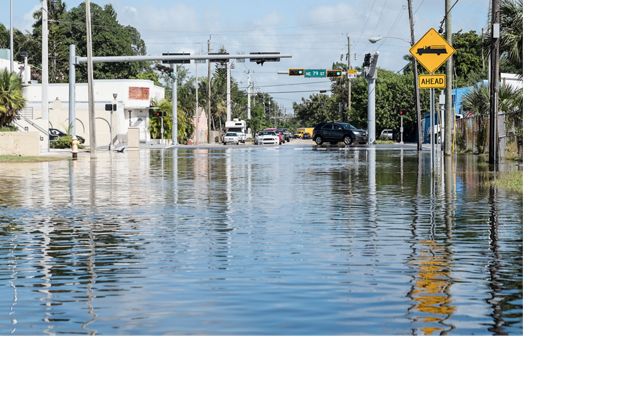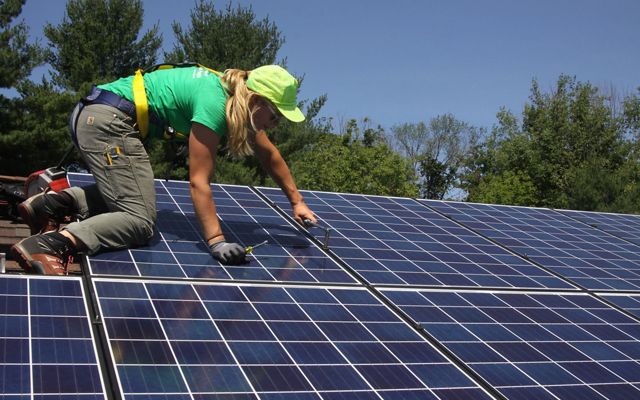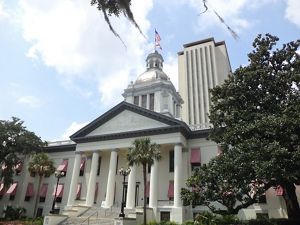Climate Leadership in Action
Taking bold climate action to achieve carbon emissions goals to protect people and nature in Florida.
Addressing the root causes and impacts of climate change is critical to protecting the quality of life of all Floridians and the health of our lands and waters. It is also critical to the success of TNC's conservation work in Florida. Our state is ground zero for climate change and its impacts are increasingly more evident over time. Warming temperatures, sea-level rise, excess rainfall and changing drought conditions all have the potential to impact Florida's people and our natural environment.


To address the impacts of climate change, TNC in Florida has adopted a goal that Florida’s greenhouse gas emissions will be at 90% of the net-zero target by 2045. This relates to the goal that the U.S. will achieve net zero emissions by 2050. Because Florida is a worldwide tourist destination with tourism as a key economic driver, climate action in Florida has a broader significance that extends well beyond its borders.
Research has shown that most Floridians support an emissions reduction strategy, and this level of broad change requires leadership and bold climate action. TNC in Florida is taking action making a positive impact on emissions reduction.
What does meaningful climate action look like in Florida?
Engaging the Public
Informing Floridians about how climate action can make a positive difference in their lives is important to build support for new policies. These would reduce carbon emissions and protect people and nature from the effects of sea level rise, heat, and extreme weather. We host a Women in Climate webinar series to promote discussion on a variety of climate-related topics facing Floridians. The webinars feature elected federal, state, and local officials, journalists, scientists, executives and businesspeople discussing strategies to address climate change and its impacts.
TNC’s CEO Jennifer Morris participated with Florida executive director Temperince Morgan in the Aspen Ideas Conference in Miami Beach. The conference brought together policymakers, scientific experts, corporate leaders, inventors and innovators, artists, youth leaders and engaged members of the public. The conference focused on the importance of climate change adaptation and mitigation, and how to scale up efforts to meet the urgency of the climate crisis.


We Can't Save Nature Without You
Sign up to receive Nature News and updates from Florida. Preview Nature News
How can we broaden our influence to promote climate action?
Building Partnership
TNC’s climate action work in Florida is focused on building partnerships with local governments, regional climate collaboratives and the private sector to amplify the impact of our climate action. TNC participates on steering and technical committees of the Southeast Florida Regional Climate Change Compact, the East Central Florida Regional Resilience Collaborative and the Greater Miami Chamber of Commerce. We have provided funding and technical assistance to support specific projects such as conducting a regional greenhouse gas inventory.
TNC also facilitates the Florida Collaborative Coordinators Forum where regional climate collaboratives share best practices for implementing climate action in their respective regions. In partnership with private corporations as well as our government partners, we are working towards a future that ensures all Floridians have equitable access to reliable and clean energy. We are taking action in our workplaces by deploying renewable energy, utilizing electric vehicles and installing charging stations at our preserves.


How will Florida achieve its ambitious carbon-reduction goals?
Implementing Policy
Achieving net zero by 2050 requires adoption of federal, state, and local policies to encourage the transition to renewable energy and electric vehicles, and the adoption of nature-based solutions that sequester carbon in agriculture, forestry, and marine ecosystems. At the federal level, TNC supported passage of the Infrastructure Investment and Jobs Act of 2021 and the Inflation Reduction Act of 2022, both of which provide incentives for deployment of clean energy. The Inflation Reduction Act is designed to reduce carbon emissions by 40% in 2030 vs. 2005 levels, primarily by increasing incentives for clean energy and electric vehicles.
Florida’s economy will significantly benefit from the incentives and grants provided by the Inflation Reduction Act. A study commissioned by TNC estimates that the new law will result in $15.4 billion of investment in Florida’s economy, supporting 22,000 jobs per year for the next ten years. This funding will jumpstart the effort to reduce carbon emissions by providing tax incentives and grant funding to individuals, local and state governments, and local communities to deploy renewable energy and electric vehicles.
Engaging the public by continuing the climate conversation, partnering collaboratively, and implementing policies that support clean energy and emissions reduction will help us achieve our climate goals and help protect people and nature in Florida.



